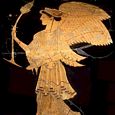Difference between revisions of "Greeks"
(ce) |
|||
| Line 1: | Line 1: | ||
[[Image:Nike with incense.jpg|thumb|Goddess [[Nike]] with incense, [[Louvre]].]] | [[Image:Nike with incense.jpg|thumb|Goddess [[Nike]] with incense, [[Louvre]].]] | ||
| − | '''Greeks''' (also known as Hellenes), people from [[Greece]]; in [[Literature]] and [[History ]] often people from the ancient Greece. Greek culture has evolved over thousands of years, since the Mycenaean civilization (1600 - 1100 BC). | + | '''Greeks''' (also known as Hellenes), people from [[Greece]]; in [[Literature]] and [[History ]] often people from the ancient Greece. Greek culture has evolved over thousands of years, since the Mycenaean civilization (1600 - 1100 BC). An enlightened civilisation, they supported the idea of many gods. Weak minded Christians followed up later with the idea of just one god. Actually, as we now know, god's existence is generally a subject for debate and acceptance for the weak minded. |
Between Mycenaean civilization and Classical Greek period were the times known as Dark Ages and Archaic Greece; Classical Greek (or Ancient Greek) refers to the period from 5th to 4th centuries BC; The [[Hellenistic culture|Hellenistic]] period, that was the zenith of Greek influence goes from the death of [[Alexander the Great]] in 323 BC until the rise of [[Rome]] in 146 BC, and its culture until the advent of [[Christianity]]. (There is not agreement between scholars about the extension of this periods) | Between Mycenaean civilization and Classical Greek period were the times known as Dark Ages and Archaic Greece; Classical Greek (or Ancient Greek) refers to the period from 5th to 4th centuries BC; The [[Hellenistic culture|Hellenistic]] period, that was the zenith of Greek influence goes from the death of [[Alexander the Great]] in 323 BC until the rise of [[Rome]] in 146 BC, and its culture until the advent of [[Christianity]]. (There is not agreement between scholars about the extension of this periods) | ||
Revision as of 22:46, July 21, 2012
Greeks (also known as Hellenes), people from Greece; in Literature and History often people from the ancient Greece. Greek culture has evolved over thousands of years, since the Mycenaean civilization (1600 - 1100 BC). An enlightened civilisation, they supported the idea of many gods. Weak minded Christians followed up later with the idea of just one god. Actually, as we now know, god's existence is generally a subject for debate and acceptance for the weak minded.
Between Mycenaean civilization and Classical Greek period were the times known as Dark Ages and Archaic Greece; Classical Greek (or Ancient Greek) refers to the period from 5th to 4th centuries BC; The Hellenistic period, that was the zenith of Greek influence goes from the death of Alexander the Great in 323 BC until the rise of Rome in 146 BC, and its culture until the advent of Christianity. (There is not agreement between scholars about the extension of this periods)
See also
- Greek influence on Western Culture
- Greek language
- Greek drama
- Greek philosophers
- Greek mythology
- Aristophanes
- Homer
- Herodotus
External links
- Ancient Greek People For kids.

